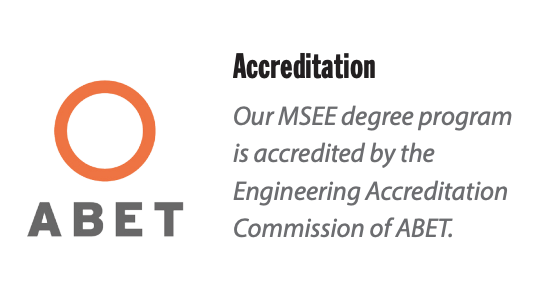MSEE Accreditation - Electrical and Computer Engineering
MSEE Degree Program Accreditation
The MSEE Degree Program is accredited by the Engineering Accreditation Commission of ABET. In 2020 NPS conferred 29 accredited MSEE degrees with 67 Students onboard as of December 2020. In 2021 NPS conferred 34 accredited MSEE degrees with 64 Student onboard as of December 2021. In 2022 NPS conferred 35 accredited MSEE Degrees with 46 students onboard as of December 2022. In 2023 NPS conferred 22 accredited MSEE Degrees with 52 students onboard as of December 2023.
Accredited programs must have published Program Educational Objectives and Student Outcomes, a process for periodic review of the objectives and outcomes, and a system of ongoing assessment that demonstrates achievement of the objectives and outcomes and uses the results to improve the effectiveness of the program.

The “Program Educational Objectives” of our MSEE program represent the abilities that we expect our graduates to have three to five years after their completion of our program. They are the skills and abilities that the graduates have to contribute to the national security of the United States (or their home countries).
- Technical Leadership: Graduates in the several years following graduation will be known and respected for their technical leadership along diverse career paths in government service and/or the private sector.
- Technical Program Management: Graduates in the several years following graduation will possess the ability to handle assignments related to research, design, development, procurement, maintenance, and life cycle management of electronic systems for Naval and other military platforms.
- Operational Utilization: Graduates in the several years following graduation will possess the ability to understand the capabilities and limitations of military electronic systems and to effectively employ electronic systems in military operations.
The Student Outcomes of the NPS MSEE program represent the knowledge, skills, and abilities that we expect our graduates to have at the time of completion of their MSEE program. These outcomes are expected to enable our graduates to achieve the Program Educational Objectives that support enhancing the national security of the United States (or the students’ home countries).
- Independent Investigation: Students will develop the ability to conduct and report the results of a technically challenging, defense-relevant independent investigation.
- Depth and Breadth of Study: Students will complete a course of study that includes appropriate depth and breadth for a masters-level student in an Electrical Engineering program by completing the graduate-level course requirements for one focus area and two specialty areas within the MSEE degree program at the Naval Postgraduate School.
ABET requires accredited programs to implement continuous improvement processes that regularly use appropriate, documented tools for assessing and evaluating the extent to which student outcomes are being attained. The NPS MSEE program achieves this goal through executive oversight with our sponsor community and within the school, and working group activities to assess, document and implement change.
- Executive Oversight: Bi-annually, the NPS MSEE program undergoes a curriculum review by a panel of practicing engineers from technical communities across the Department of Defense (DoD). Then semi-annually, the ECE Accreditation Steering Committee meets to review findings of the various ABET assessment metrics, and conducts a review of ABET accreditation standards that may have changed since the last meeting. The steering committee then produces policy for the department to improve student outcomes.
- Working Group Activities: Quarterly, the student outcome planning group meets to integrate the ECE course coordinators’ expertise into the assessment planning process. Also quarterly, the department conducts a documentation review to ensure all required assessment and student feedback reports for the quarter were completed. Finally, the department completes a semi-annual technical area review of assessments conducted in the preceding quarters and helps set the agenda for the semi-annual executive steering committee.

